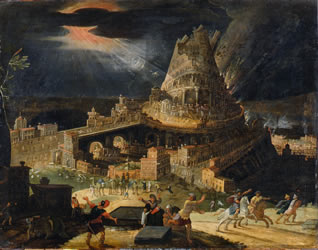Misconception #50 (Cont’d)
Before the Tower of Babel, Everyone Spoke Just One Language
In looking at this familiar story of the Tower of Babel, it’s critical to remember our three laws of disinformation! First, latch onto a genuine truth of Scripture. Second, isolate that truth from its context. And third, repeat the new version of the “truth” until it’s rendered altogether alien from its original meaning.
Now, let’s see how this process has affected the history of this tower. First, place the story, depicted in the eleventh chapter of Genesis, on a pedestal of boundless conviction. Then, excise it from the rest of the book to create the impression that Scripture has nothing else to say about it. And finally, repeat this version of the story, again and again, thereby removing any doubt that The Bible or any of its supporters are anything but in complete agreement with this revised version.
Story Continues Below
Says Richard Price—the founder and CEO of Academia.edu—on his podcast In Depth With Academia:
Fish Tales (From the Belly of the Whale): Fifty of the Greatest Misconceptions Ever Blamed on The Bible is:
To hear Price’s book review of Fish Tales (From the Belly of the Whale), CLICK HERE.
To hear Kent and Zen Garcia talk about correcting biblical misconceptions, from June 23rd, 2021, CLICK BELOW.
Story Continues From Above
The end result: From the beginning of time, mankind always spoke in a single language until they attempted to unite in an unholy alliance to undermine heavenly authority. Then God got fed up and, to subvert their power grab, He divided their language into many different ones, thereby scattering their efforts to the wind. The End, right?
Again I say: Not so fast!
Still, I can sense an argument from many people. You may be asking: “But won’t I be rejecting The Bible if I no longer believe this story the way it’s been told all these years?”
Fortunately, the answer is: “No, you won’t be rejecting The Bible if you simply allow it to fill in the missing pieces of the puzzle on its own.”
Never mind about human traditions that have only managed to provide us with an incomplete picture of this story, because as it turns out,The Bible really does have more to say on this subject than we’ve been led to believe. What’s more, it’s imperative that we come to a fuller understanding of what it says about this subject because so many people’s faith are depending on a genuine awareness of what the Scriptures really say, and not merely a half-baked version of them.
I mean, if The Bible supposedly reports on important events in humanity’s history, then shouldn’t it be allowed to speak for itself? In the end, it’ll prove its own ability to validate itself. If not, then the skeptics and naysayers will forever think themselves capable of toppling the truth of Scripture. Therefore, it’s always our job as truth seekers to dig to the bottom of every mystery, no matter how much it may rattle our own cherished traditions.
And to think: The antidote for this kind of disinformation is simply a willingness to read The Bible for oneself. Stranger still, we only have to read the chapter immediately preceding the eleventh chapter of Genesis. Let’s see for ourselves.
Now these are the generations of the sons of Noah: They are Shem, Ham, and Japheth, and to them were born sons after the Great Flood. The sons of Japheth were Gomer, Magog, Madai, Javan, Tubal, Meshech, and Tiras. By these were the isles of the Gentiles divided in their lands; every one of them after their own tongue, after their families, and in their nations. And the sons of Ham were Cush, Mizraim, Phut, and Canaan. These are the sons of Ham, after their tongues, in their countries, and in their nations. And to Shem, the father of all the children of Eber, the brother of Japheth, the oldest, even to him were born children, including Elam, Asshur, Arphaxad, Lud, and Aram. So these are the sons of Shem, after their families, after their tongues, in their lands, and after their nations.1
Imagine that: In a plain and simple way, The Bible itself defies the misconception that before the Flood everyone spoke just one language. The tenth chapter of Genesis depicts a world where, before the Tower of Babel was ever conceived, the sons of Noah already spoke separate languages, each according to their own nation, country, and family, much as in today’s world where geographical divides cause a language to splinter into a multiplicity of dialects.
In light of this context, then, we might better understand the hidden meaning in that simple phrase in Genesis that we’ve already visited but that can now be seen differently.







